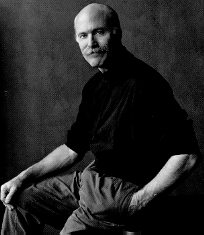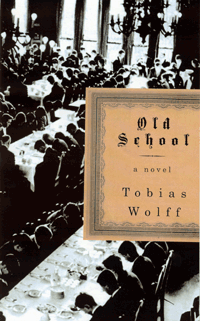 Tobias Wolff |
November 10, 2003 (Monday) 4:15 p.m. Informal Seminar 8:00 p.m. Reading Both Assembly Hall, CC UAlbany, Uptown Campus |
 |

 Tobias Wolff |
November 10, 2003 (Monday) 4:15 p.m. Informal Seminar 8:00 p.m. Reading Both Assembly Hall, CC UAlbany, Uptown Campus |
 |
Tobias Wolff was a visiting writer at the New York State Writers Institute on September 16, 1997.Tobias Wolff, master of the memoir and the short story, has just published his first novel, Old School (November 2003), the story of a working class boy who seeks to "blend in" at a posh New England prep school.
Tobias Wolff is best known for his 1989 memoir of childhood, This Boy's Life which provided the basis of a 1993 motion picture. In the film, Leonardo DiCaprio plays the author as a teenager, Ellen Barkin plays his mother, Robert De Niro plays his abusive stepfather. The movie marked DiCaprio's first major role in a serious film.
Widely regarded as a classic tale of American boyhood, the memoir received the Los Angeles Times Book Prize for biography, and the Ambassador Book Award of the English-speaking Union.
"Few authors have reported their early years, wasted, halcyon, or otherwise, with the same suspense, longing, loathing, and glorious humor. The writing is clear and merciless, and the chapters are as fluid and perfect as anything I've read in years." - Jeff Danziger, Christian Science Monitor, on This Boy's Life
Wolff's second memoir, In Pharaoh's Army: Memories of the Lost War (1994), an unflinching account of the author's tour of duty in Vietnam, was chosen as a finalist for the National Book Award.
"a terse, mesmerizing memoir [that] reads like a rigorously boiled down short story�" - Paul Gray, Time"relaxed utterly lucid prose" - The American Heritage
A three-time winner of the O. Henry Award, Tobias Wolff is also celebrated for his collections of short stories. Tribune Books reviewer Bruce Allen called In the Garden of the North American Martyrs (1981), Wolff's first book, "one of the most acclaimed short story collections within memory."
Wolff's second collection, Back in the World (1985), was hailed as a sensitive work of fiction focusing primarily on the experiences of returning Vietnam veterans.
"terrific" and "The magic of [Wolff's] fiction cannot be explained. It is the ancient art of the master storyteller." - Tim O'BrienWolff's third collection, The Night in Question (1996), follows various characters in their search for authenticity and moral satisfaction. Jay Parini, writing in the New York Times Book Review, said that "readers will be stirred by Mr. Wolff's marvelous stories, by their pure unexpectedness and--perhaps most of all--by their music."
Wolff is also the author of a novella, The Barrack's Thief (1984), the comic tale of three paratroopers who guard an ammunition dump at Fort Bragg, North Carolina during an approaching forest fire. In a glowing review, America critic Andre Dubus said, "If words on paper could make sounds, you would hear me shouting now, urging you to read this book." The Barrack's Thief earned Wolff the PEN/Faulkner Award for Fiction in 1985.
In literary circles, Wolff is revered as much as a teacher as he is as a writer. After completing a Stegner Fellowship at Stanford University, Wolff served as the Jones Lecturer in Creative Writing at that institution (1975-1978). He later became one of the leading lights of the Creative Writing Program at Syracuse University for 17 years (1980-97). In 1997, he returned to Stanford where he presently teaches.
Wolff is the past editor of various anthologies, including The Picador Book of Contemporary American Short Stories (1993), The Vintage Book of Contemporary American Short Stories (1994), Best American Short Stories (1994), Best New American Voices (2000) and Writers Harvest 3 (2000). His writings have appeared in the Washington Post, New Yorker, Atlantic, Granta and Esquire.
". . .the reader will be stirred by Mr. Wolff's marvelous stories, by their pure unexpectedness and--perhaps most of all--by their music." - Jay Parini, New York Times Book Review on The Night in Question
"This book of stories by Tobias Wolff is an occasion for which we should be grateful. They are about real people and real things, thank God, and I think they are the work of a young master. They have to do with conduct--how we live our lives now. They are moral stories, but they are not didactic or cautionary. Some of them are funny. Some are chilling..... and not one doesn't in some way speak to the human condition."
So wrote Raymond Carver about Tobias Wolff's first book; and that judgment describes perfectly these fifteen new stories, his first collection in a decade. In the intervening years, Mr. Wolff has also published a prizewinning novella and two groundbreaking memoirs--clearly a writer working at the very height of his powers, what Tim O'Brien has called "the ancient art of a master storyteller."
A man is shot dead while standing in line at the bank, another is fired for printing an obituary of a citizen as yet undeceased. A young woman visits her father following his nervous breakdown, and a devoted sister is profoundly unsettled by the sermon her brother insists on reciting. Whether in childhood or Vietnam, in memory or the eternal present, these people are revealed in the extenuating, sometimes extreme circumstances of everyday life, and in the complex consequences of their decisions--that, for instance, can bring together an innocent inner-city youth and a little girl attacked, months earlier, by a dog in a wintry park. Yet each story, however crucial, is marked by Mr. Wolff 's compassionate understanding and humor.
In short, fiction of dazzling emotional range and absolute authority.




| Sunday Gazette Article Times Union Article The Atlantic Monthly Writers Online Magazine Article |